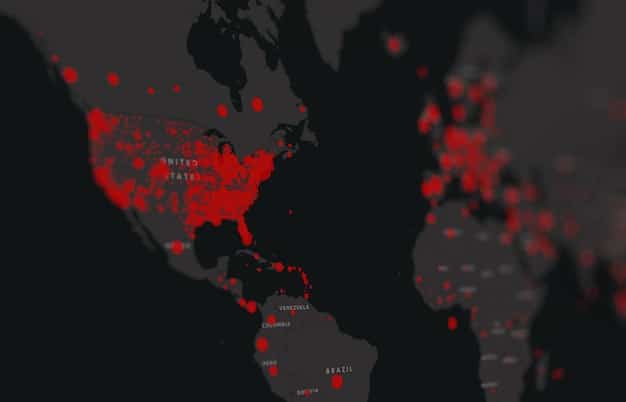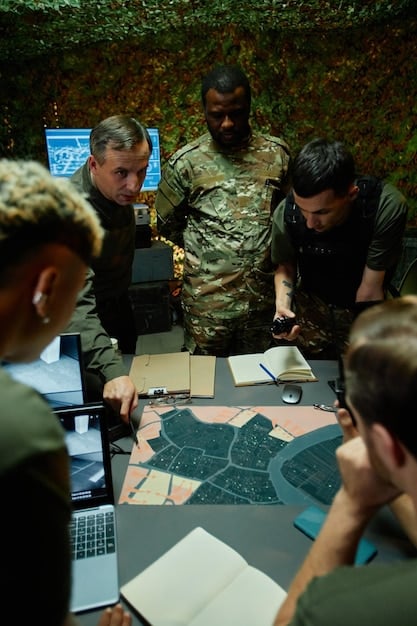US Response to Terrorism: Countering Threats in Southeast Asia

The US is likely to respond to the growing threat of terrorism in Southeast Asia through a multi-faceted approach, including strengthening security partnerships, enhancing intelligence sharing, providing counter-terrorism training, and addressing the root causes of extremism.
The threat of terrorism in Southeast Asia is a growing concern for the United States. Understanding how will the US respond to the growing threat of terrorism in Southeast Asia requires analyzing current strategies, potential future actions, and the complex geopolitical landscape of the region.
Understanding the Evolving Terror Landscape in Southeast Asia
Southeast Asia has become a fertile ground for terrorist groups due to factors such as political instability, economic disparities, and porous borders. Understanding the dynamics of these groups is vital for formulating effective counter-terrorism strategies.
Several factors contribute to the growth of terrorism in the region. These include:
- Weak governance and corruption, which create opportunities for extremist groups.
- Socio-economic inequalities that lead to disenfranchisement and radicalization.
- The spread of extremist ideologies through online platforms.

Key Terrorist Groups in Southeast Asia
Several terrorist groups operate in Southeast Asia, each with its own agenda and capabilities. Some of the most prominent ones include:
- Jemaah Islamiyah (JI), responsible for the 2002 Bali bombings.
- Abu Sayyaf Group (ASG), known for kidnappings and bombings in the Philippines.
- Islamic State (ISIS) affiliates, who seek to establish a caliphate in the region.
The Role of Foreign Fighters
The influx of foreign fighters into Southeast Asia has further complicated the terror landscape. These individuals bring with them combat experience, ideological fervor, and financial resources that can bolster local terrorist groups.
In conclusion, the evolving terror landscape in Southeast Asia poses a complex challenge that requires a multi-faceted approach. Understanding the root causes of terrorism, the dynamics of terrorist groups, and the role of foreign fighters is essential for formulating effective counter-terrorism strategies.
Current US Counter-Terrorism Strategies in the Region
The US has been actively involved in counter-terrorism efforts in Southeast Asia for decades. These efforts include military assistance, intelligence sharing, and diplomatic engagement.
Existing U.S. strategies involve:
- Military Aid: Providing training and equipment to regional security forces.
- Intelligence Sharing: Collaborating with local intelligence agencies to track and disrupt terrorist networks.
- Diplomatic Engagement: Working with governments to address the root causes of terrorism.
The Role of Joint Military Exercises
Joint military exercises play a crucial role in enhancing the capabilities of Southeast Asian security forces and promoting interoperability with the US military. These exercises also serve as a deterrent to potential aggressors.
- Cobra Gold: An annual multinational exercise co-hosted by Thailand and the US.
- Balikatan: A bilateral exercise between the Philippines and the US.

Challenges to Current Strategies
Despite the US efforts, counter-terrorism strategies in Southeast Asia face numerous challenges. These include:
- Limited resources and capacity among regional security forces.
- Corruption and weak governance that hinder effective counter-terrorism efforts.
- The spread of extremist ideologies through online platforms.
In conclusion, current US counter-terrorism strategies in Southeast Asia have had some success, but they also face numerous challenges. Addressing these challenges requires a more comprehensive and coordinated approach that involves all stakeholders.
Potential Future US Responses to the Terror Threat
Given the evolving nature of the terror threat in Southeast Asia, the US is likely to adapt its counter-terrorism strategies in the future. This may involve increased military involvement, enhanced intelligence gathering, and a focus on addressing the root causes of extremism.
Potential strategies could include:
- Increased Funding: Allocating more resources to counter-terrorism efforts in the region.
- Enhanced Cyber Security: Strengthening efforts to combat the spread of extremist ideologies online.
- Community Engagement: Working with local communities to address the root causes of terrorism.
The Role of Technology in Counter-Terrorism
Technology can play a crucial role in counter-terrorism efforts. This includes:
- Data analytics: Using data to identify potential terrorist threats.
- Surveillance technology: Using surveillance to monitor terrorist activities.
- Cyber security: Protecting against cyber attacks by terrorist groups.
Strengthening Regional Partnerships
The US can strengthen its counter-terrorism efforts by working more closely with regional partners. This includes:
- Sharing intelligence: Providing regional partners with timely and accurate intelligence.
- Providing training: Helping regional partners develop their counter-terrorism capabilities.
- Coordinating operations: Conducting joint operations to disrupt terrorist networks.
In conclusion, the US is likely to adapt its counter-terrorism strategies in Southeast Asia in the future. This may involve increased military involvement, enhanced intelligence gathering, and a focus on addressing the root causes of extremism.
The Geopolitical Implications of US Involvement
US involvement in counter-terrorism efforts in Southeast Asia has significant geopolitical implications. This includes:
- Relations with China: US counter-terrorism efforts may be viewed by China as an attempt to contain its influence in the region.
- Relations with Russia: Russia has also been increasing its influence in Southeast Asia, and US counter-terrorism efforts may be seen as a challenge to its interests.
- Regional Stability: US counter-terrorism efforts can help to promote regional stability, but they can also exacerbate tensions if not implemented carefully.
Balancing Security Concerns with Diplomatic Relations
US counter-terrorism efforts in Southeast Asia must be balanced with the need to maintain positive diplomatic relations with regional partners. This requires:
- Respecting the sovereignty of regional partners.
- Addressing the root causes of terrorism.
- Promoting economic development and good governance.
The Impact of US Policy on Regional Perceptions
US policy towards Southeast Asia can have a significant impact on regional perceptions. This includes:
- The perception of US as a reliable partner.
- The perception of US as a promoter of democracy and human rights.
- The perception of US as a protector of regional security.
In conclusion, US involvement in counter-terrorism efforts in Southeast Asia has significant geopolitical implications. Balancing security concerns with diplomatic relations is essential for maintaining regional stability and promoting US interests.
Assessing the Effectiveness of US Aid and Training Programs
The effectiveness of US aid and training programs in Southeast Asia is a critical factor in determining the success of counter-terrorism efforts. It’s important to analyze how these programs are designed, implemented, and evaluated.
Key aspects to consider:
- Program Design: Are programs tailored to the specific needs of each country?
- Implementation: Are programs being implemented effectively and efficiently?
- Evaluation: Are programs being evaluated regularly to assess their impact?
Success Stories and Lessons Learned
There have been several success stories in US aid and training programs in Southeast Asia. For example:
- Improved capabilities of regional security forces, leading to successful counter-terrorism operations.
- Increased intelligence sharing, leading to the disruption of terrorist networks.
However, there have also been lessons learned. These include:
- The need for greater coordination among US agencies and regional partners.
- The need for more effective monitoring and evaluation mechanisms.
Addressing Corruption and Promoting Good Governance
Corruption and weak governance can undermine the effectiveness of US aid and training programs. Addressing these issues requires:
- Promoting transparency and accountability.
- Strengthening legal and judicial systems.
- Supporting civil society organizations.
In conclusion, assessing the effectiveness of US aid and training programs in Southeast Asia is a critical factor in determining the success of counter-terrorism efforts. This requires careful program design, effective implementation, and regular evaluation.
The Role of Soft Power in Countering Extremism
Soft power, which includes cultural influence, public diplomacy, and economic assistance, can play a crucial role in countering extremism in Southeast Asia. By promoting positive values and building relationships, the US can help to undermine the appeal of extremist ideologies.
Soft power tools include:
- Cultural Exchange Programs: Promoting understanding and tolerance through cultural exchanges.
- Educational Initiatives: Providing educational opportunities to young people in Southeast Asia.
- Economic Assistance: Promoting economic development and job creation.
Countering Extremist Narratives Online
Extremist groups use online platforms to spread their ideologies and recruit new members. Countering these narratives requires:
- Developing counter-narratives that promote positive values.
- Working with social media companies to remove extremist content.
- Supporting local initiatives that promote critical thinking and media literacy.
Engaging with Local Communities and Religious Leaders
Engaging with local communities and religious leaders is essential for building trust and promoting tolerance. This includes:
- Supporting community-based initiatives that promote interfaith dialogue.
- Working with religious leaders to promote moderate interpretations of Islam.
- Addressing the grievances of marginalized communities.
In conclusion, soft power can play a crucial role in countering extremism in Southeast Asia. By promoting positive values, building relationships, and engaging with local communities, the US can help to undermine the appeal of extremist ideologies.
| Key Area | Brief Description |
|---|---|
| 🛡️ Military Aid | Providing training and equipment to Southeast Asian security forces. |
| 🤝 Regional Partnerships | Strengthening collaboration with regional partners to share intelligence and coordinate operations. |
| 🌐 Cyber Security | Combating the spread of extremist ideologies online and protecting against cyber attacks. |
| 📚 Educational Initiatives | Providing educational opportunities to young people in Southeast Asia to promote positive values. |
Frequently Asked Questions
▼
Key groups include Jemaah Islamiyah (JI), Abu Sayyaf Group (ASG), and ISIS affiliates, each pursuing distinct objectives.
▼
The US provides military aid, intelligence sharing, and diplomatic engagement to support regional counter-terrorism efforts.
▼
Future approaches may include increased funding, enhanced cyber security, and greater community involvement to address root causes.
▼
US actions affect relationships with China and Russia, requiring a careful balance between security and diplomatic concerns.
▼
Soft power, through cultural exchange and education, helps undermine extremist appeal by promoting positive values and building relationships.
Conclusion
In conclusion, the US response to the growing threat of terrorism in Southeast Asia is multifaceted, involving military aid, intelligence sharing, geopolitical balancing, and soft power initiatives. The effectiveness of these measures depends on addressing the root causes of extremism, strengthening regional partnerships, and adapting strategies to the evolving terror landscape.





